新视野商务英语视听说(上)教案
外研社新视野商务英语视听说_第三版_上__电子教案unit2
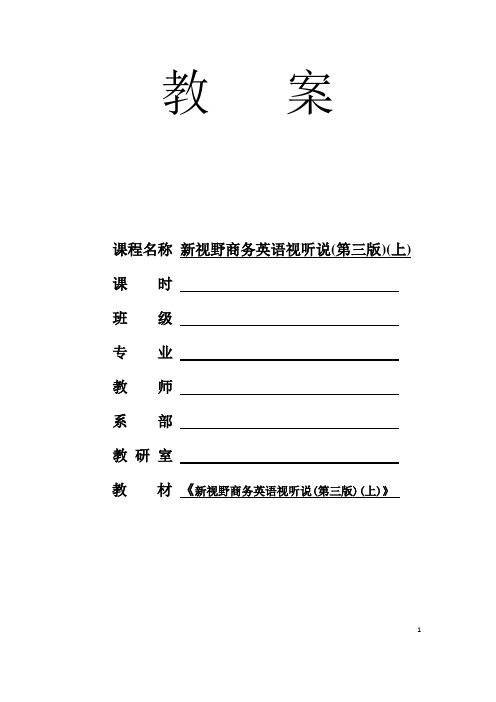
教案课程名称新视野商务英语视听说(第三版)(上) 课时班级专业教师系部教研室教材《新视野商务英语视听说(第三版)(上)》1Unit 2 Jobs and ResponsibilitiesLearning Objectives(教学目标)2Business Profile(内容概览)Want to Know About Jobs and Responsibilities in aCompany?OverviewThis unit mainly looks at various job titles and responsibilities in a company as people may be expected to talk about these aspects of their work. Firstly, an employee may have to show a visitor around the offices of their company. More generally, an employee may be asked to describe how the business is organised or structured. Furthermore, people in business may often be called upon to describe to outsiders or friends what their company actually does.A company is usually divided into departments covering areas such as administration, sales, billing, production, shipping, etc. Below is a chart showing some common departments and positions in the business world.Common Departments and Positions in a Company3Main Responsibilities of Some Common PositionsThese can vary a lot in different companies so the following is only a rough indication of the typical responsibilities.Senior Sales Manager●Work with a team of sales people and support staff to secure both new and old business and to deepen existing business relationships;●Monitor, encourage, advise and direct sales activity by individual sales staff in order to achieve revenue targets;●Define and plan the different steps of a project, allocate action and responsibilities within the overall project framework to achieve timely and cost-effective project completion.Financial Controller●Responsible for all accounting, financial and taxation matters;●Help local offices with budgeting and annual spending projections;●Arrange for internal and external audits, ensure checks and balances on spending;●Control and safeguard company assets, develop the matrix of levels of authority for expense review and approval.Human Resources Manager●Support the Business Head in setting strategy, direction and objectives with regard to personnel;●Responsible for hiring appropriate personnel and ensuring career progression;●Identify, interpret and apply key performance indicators and monitor business managers’use of such indicators;4●Review and evaluate proposals for job regrading, training, promotion, transfer, and salary progression with respect to business needs and internal relativity.Logistics Manager●Manage supplies, components, raw materials and inventories with the objective of ensuring production being constantly supported and stocked;●Manage imports, including customs clearance;●Negotiate and maintain contracts with transportation and freight companies. Account Manager●Support named customers, provide quotations, product recommendations and after sales advice;●Support the local sales staff with technical recommendations and communication with producers;●Develop new customers and other sales opportunities;●Act as an interface between factories and customers.Purchaser/Buyer●Responsible for supplier identification and pre-screening of materials;●Benchmark and negotiate pricing, terms, and other related issues with potential suppliers to ensure fair market pricing.Language Expansion(语言扩充)JobsWhat kind of job do you have?What line of business are you in?5I’m a freelance corporate law consultant.I’m a civil servant, with permanent tenure.ResponsibilitiesWhat does your job involve?I take care of/look after overseas customers.I usually answer telephones and write reports.Positions and the departmentsWhat position do you hold?Who are you responsible/accountable to?I’m accountable to the Regional Manager.My section comes under the Logistics Department.Working hours and routinesWe are on flextime.I am a bus driver; I work all sorts of hours.On Monday, I work on the early/late/split shift.Interpersonal relationshipMy boss is quite nice. He gets on very well with us.My boss is a very difficult person to work with.Most of my colleagues are friendly and cooperative.CompensationI get about $800 a month in commissions.The meals in the work cafeteria are subsidised.PromotionI’ve just been promoted Head of Human Resources.6I’m after the administrator’s job.I’m in line for the position of Export Sales Manager.He is being groomed for promotion.Job satisfactionI like/don’t like my present job.I hate my job because I can’t stand/bear my boss.I don’t like what I’m doing right now because it’s boring.Our normal official working hours are 40 hours a week.7Teaching Tips(教学步骤)Pre-viewing●Divide the Ss into groups and have Ss work out the organisation of a real estate company first.●Instruct Ss to further discuss the positions included in each department.●Remind Ss of job titles introduced in previous activities.●Ask one or two group representatives to report the departments they’ve figured out.Post-viewing●Ask Ss to work together in groups to summarise the responsibilities of the managers and write them down in the textbook.●Ask seven groups to answer the questions in turn.●Ask other groups to add information or make corrections if necessary.Pre-viewing●Ask Ss to brainstorm different types of business organisation.●Divide the class into pairs and get Ss to exchange their understanding of the companieslisted in the left column of the chart in the Student’s Book.●Ask Ss to work together to match types of company with their corresponding8descriptions.●If needed, the following types of company can be introduced for further study.Types of companycompany (BrE)/corporation (AmE) 公司firm 公司,商行/号enterprise 企业township enterprise 乡镇企业state-owned enterprise 国有企业privately-owned enterprise 个体/私营企业solely/wholly owned enterprise 独资企业foreign capital enterprise 外资企业Sino-foreign joint venture 中外合资企业multinational/international/transnational corporation/company 跨国公司group corporation 集团公司limited company 有限公司parent company 母公司subsidiary/affiliate company 子公司partnership 合伙公司holding company 控股公司listed/quoted company 上市公司cooperative 合作公司industrial corporation 实业公司9consulting company 咨询公司Post-viewing●Divide the class into pairs and ask Ss to allocate the roles.●Encourage Ss to refer to the expressions in the video when role-playing the dialogue.●Walk around the classroom to monitor Ss’performance.●Ask two pairs of Ss to present their dialogue in class.●Give comments and suggestions for improvement.Text Bank(扩展阅读)Get to Know YourselfThere is a big difference between getting a job and reaching a career destination where you love what you do! This section on self-discovery gives you some tools to learn more about yourself and suggests ways to translate that self-knowledge into successful career planning and job search goals. The first step in your self-discovery quest is one that you will repeat many times in your life: an inventory of your interests, values, personal style and skills. Even if you have a good idea of what you want to do, self-assessment is vital to writing a resume and doing well in an interview. These exercises will provide a frame of reference when you begin to explore your career options.10Where are you in the career planning cycle? Use the bullets below as a guide to see what you have and still have left to do.Self-Assessment—Obtaining Information About Yourself●I am aware of the interests that I possess and can name five activities that I enjoy.●I am aware of the skills that I possess and can identify my five most developed skills.●I am aware of the personality characteristics that I possess and can name five characteristics to describe myself.●I know what I value in a career and can list five work-related values that meet my career expectations.Career-Exploration—Increasing Knowledge of Career Options●I can identify ten careers that integrate my interests, skills, personality characteristics and work-related values.●I can identify five career resource publications that provide information about my career options.●I can list the names and titles of five people to ask for information about my career options.Career Decision-Making—Selecting a Primary Career Goal●I have researched information on five career choices.●I am familiar with one decision-making method and can describe that process.●I have made a career decision and can describe that choice in detail (i.e. title, duties, qualifications, salary, career path).Preparation—Creating a Career Goal Action Plan11●I can identify five work-related qualifications that are necessary in my career choice.●I can identify academic programmes and courses relevant to my career choice (i.e. major, minor, graduate schools).●I can list the titles/locations of five volunteer, internship, or work experience opportunities relevant to my career choice.●I can name five student/professional organisations that are related to my career choice.Job Search—Job Seeking and Career Employment●I have developed an effective resume and cover letter.●I have developed effective interviewing skills.●I am familiar with five different strategies for job seeking.●I can name ten companies or industries that are potential employersCareer Management—Advancing in Your Career●I can describe and rank by preference the positions I have been offered.●I have accepted an offer of career employment.●I can describe methods of advancing in my organisation. I can describe my next career goal.●I know how to initiate a career change when it is necessary.Discussion:Where are you in the career planning cycle? What have you done? And what have you left to do?12补充教学资源Video 1Introducing titles and responsibilitiesPresident: Good afternoon, everyone! This is Robin Copperfield, the new Vice President of our company. He will be in charge of the accounting work. Let’s give him a warm welcome!Robin: Thank you!President: Mr. Copperfield is an expert in the field of accounting. So, it is a pleasure for us to have him here. Now, Mr. Copperfield, I’d like to introduce the Vice Presidents and Managers to you.Robin: OK, thank you!President: This is May Bates, Vice President in charge of the Administration Department and the Neighbourhood Service Department.Robin: Nice to meet you, Ms. Bates.Ms. Bates: Nice to meet you, Mr. Copperfield.President: And this is Dennis Hayes, Vice President in charge of the MarketingDepartment and the Sales Department.Dennis Hayes: How do you do, Mr. Copperfield? Glad to meet you.Robin: Glad to meet you, Mr. Hayes.President: And this is... oh, where is Andrew Jefferson?Robin: Mr. Jefferson? I’ve met him before. I heard he is one of the secrets of this company’s success. Everyone was raving about what a great job he’s done in...President: Uh... speak of the devil... Mr. Jefferson has just arrived.Mr. Jefferson: Hi, Mr. Copperfield, good to see you again.Robin: Good to see you, Mr. Jefferson.13Mr. Jefferson: Sorry, I’m late. I was talking to a client.Robin: Oh, that’s OK. How many departments are you in charge of, Mr. Jefferson?Mr. Jefferson: Four: Research & Development, Engineering, Contract Budgets, and Project Preparation.Robin: No wonder you’re so busy.President: Mr. Copperfield, there are three managers who report directly to you, and they are all ladies. So, ladies, can you introduce yourselves?Ada Black: I’m Ada Black, responsible for management accounts.Caroline Clinton: I’m Caroline Clinton, responsible for financial accounts.Lucy White: I’m Lucy White, responsible for data processing.Robin: Oh, good. Nice to meet you all, ladies.Video 2Do you like your job?Robin: What’s your job now, Jerome? Do you still work for that wholly funded American company?Jerome: No, I left it three years ago. I have my own business now.Frank: Gee, that’s great! How do you feel as a self-employed entrepreneur?Jerome: I feel good. I can make a lot more money than before and I have a lot of independence in doing things. But sometimes I get tired. As you know, it’s not very easy to run a business on your own. What about you, Frank? What are you doing now?Frank: I’ve worked for several companies. After graduation, I went to a private company. Then a year later, I changed to a Sino-Japanese joint-ventureenterprise and worked as a sales assistant. Two years later, I moved on to a computer company and w orked in export sales. And now, I’m an advertising executive.Colin: Oh, you are a real job-hopper. Why have you changed jobs so often?14Frank: I’m always interested in new challenges. I know changing jobs frequently can be a waste of a company’s human resources, but I’m gaining a lot of experience! How is your job, Colin?Colin: I’ve been working for the PMC Textile Plant since I graduated. Two years ago, I was promoted to Line Supervisor.Frank: Do you like your job?Colin: The salary and benefits are OK, but I don’t like the work environment. You know, the workshops are very noisy sometimes. Also, I don’t often get an opportunity to go anywhere. I hate staying in the same place all the time. You often travel on business, right Robin?Robin: Yes. As a buyer, I must travel to purchase stock. I’ve been to a lot of places. Colin: Maybe I should think about becoming a buyer...Robin: Mm..., everything has two sides. I get fed up with travelling. Nowadays, I want to spend more time with my family.Janet: Hi, guys, may I join you?Everybody: Sure. Have a seat.Janet: You enjoy getting together, don’t you? What are you talking about?Robin: Jobs. What kind of job do you have, Janet?Janet: I’m the Public Relations Manager in a holding company.Colin: Do you enjoy it?Janet: Yes. What I like about it is that I can meet a lot of new and interesting people. Robin: How about your working hours?Janet: That’s the trouble. I usually have to work overtime, because I often have dinner parties in the evening. I don’t get enough time with my family and baby.15。
新视野商务英语视听说(上)第四版授课计划
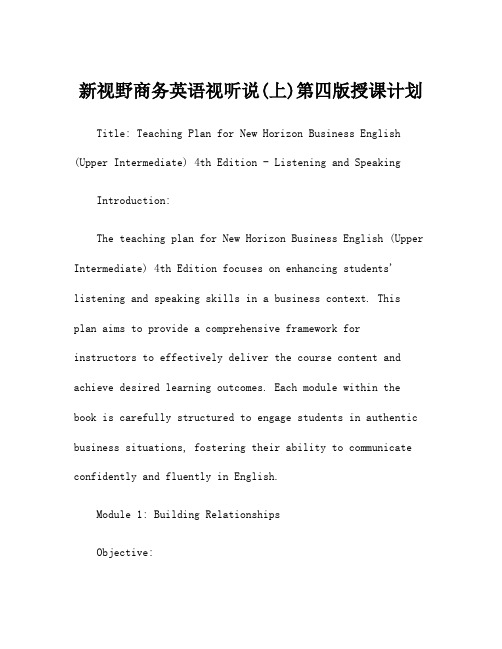
新视野商务英语视听说(上)第四版授课计划Title: Teaching Plan for New Horizon Business English (Upper Intermediate) 4th Edition - Listening and Speaking Introduction:The teaching plan for New Horizon Business English (Upper Intermediate) 4th Edition focuses on enhancing students' listening and speaking skills in a business context. This plan aims to provide a comprehensive framework forinstructors to effectively deliver the course content and achieve desired learning outcomes. Each module within the book is carefully structured to engage students in authentic business situations, fostering their ability to communicate confidently and fluently in English.Module 1: Building RelationshipsObjective:- Develop listening skills for understanding conversations in networking events.- Enhance speaking skills to initiate and maintain professional relationships.Activities:1. Listening Practice: Students listen to dialogues and presentations related to networking events, focusing on key phrases and expressions used in socializing and making introductions.2. Speaking Exercise: Pair or group discussions on effective networking strategies and techniques. Role-play scenarios simulating networking situations to practice conversational skills.Module 2: Company Structure and CultureObjective:- Improve listening comprehension of discussions on organizational structures and corporate culture.- Foster speaking abilities to describe companystructures and cultures accurately.Activities:1. Listening Tasks: Students listen to audio recordings of interviews with company executives discussing their organization's structure and culture. They identify key information and main ideas.2. Speaking Practice: Group discussions on various company structures and cultures. Students present findings on a chosen company's structure and culture, focusing on language accuracy and coherence.Module 3: Business Trends and InnovationsObjective:- Enhance listening skills to comprehend discussions on emerging business trends and innovations.- Develop speaking proficiency to express opinions and ideas on business developments.Activities:1. Listening Exercises: Students listen to podcasts or interviews discussing current business trends and innovations. They summarize main points and identify key trends.2. Speaking Tasks: Pair or group discussions on theimpact of technology and innovation on different industries. Debates on the advantages and disadvantages of specific business trends, encouraging critical thinking and persuasive speaking.Module 4: Marketing StrategiesObjective:- Strengthen listening comprehension of marketing presentations and discussions.- Cultivate speaking abilities to articulate marketing strategies and concepts effectively.Activities:1. Listening Activities: Students listen to marketing presentations and case studies, focusing on language related to product promotion, market segmentation, and branding.2. Speaking Exercises: Group presentations on marketing strategies for a given product or service. Role-plays simulating client meetings to negotiate marketing plans and strategies.Module 5: Negotiation SkillsObjective:- Improve listening skills for understanding negotiation tactics and strategies.- Enhance speaking proficiency to negotiate effectively in various business scenarios.Activities:1. Listening Practice: Students listen to negotiation simulations and role-plays, analyzing negotiation techniques such as bargaining, compromising, and problem-solving.2. Speaking Tasks: Pair or group negotiation exercises on different business scenarios, such as contract negotiations, price discussions, and partnership agreements. Feedback and reflection on negotiation performance to identify strengths and areas for improvement.Conclusion:The teaching plan outlined above provides a structured approach to develop students' listening and speaking skills in a business context using the New Horizon Business English (Upper Intermediate) 4th Edition textbook. By engaging in avariety of activities, students will not only improve their language proficiency but also gain valuable insights into the world of business, preparing them for success in their professional endeavors.。
新视野商务英语视听说上课件U2

Script
Pre-viewing
1. Work in groups. What departments make up a real estate company? Try to figure out as many as you can and write them down.
Department of Human Resources Department of Marketing and Sales Department of Administration Department of Neighbourhood Service Department of Project Preparation Department of Engineering Department of Contract Budgets Department of Research & Development Department of Audits and Accounts
Develop customer relations and grow the Regional Sales Manager sales of security products in Ohio.
business analyst
Be in charge of the budget.
lawyer receptionist
10. singer
Task 1 Translate the Chinese sentences into English first, then listen to the dialogue and check your translations.
I’m a manager in the Human Resources Department Which company do you work for
新视野商务英语视听说上课件U5
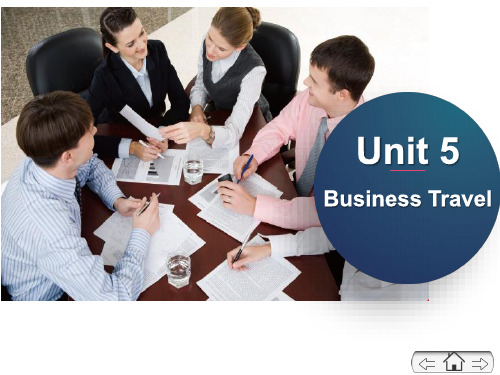
Script
Script
Task 2 2. Listen to another five conversations and fill in the blanks.
reserve a room check for rather full
ticket and passport
boarding pass tags
Room service
black
plainBiblioteka declare belongings
subject to
check out comes to
receipt
Script
Script
Follow-up Practice
Follow-up Practice 1. Listen to a conversation at the check-in counter, then complete the chart below.
Follow-up Practice 1. Answer the following questions briefly according to what you hear.
From January 15th to 18th. No, there isn’t. By credit card. He is booking a small conference room. He is asking for a wake-up call for tomorrow morning. Approximately 8 hours.
Work in pairs. What will people usually do when they travel by air? Rearrange the following steps in the correct order.
商务英语视听说教学设计
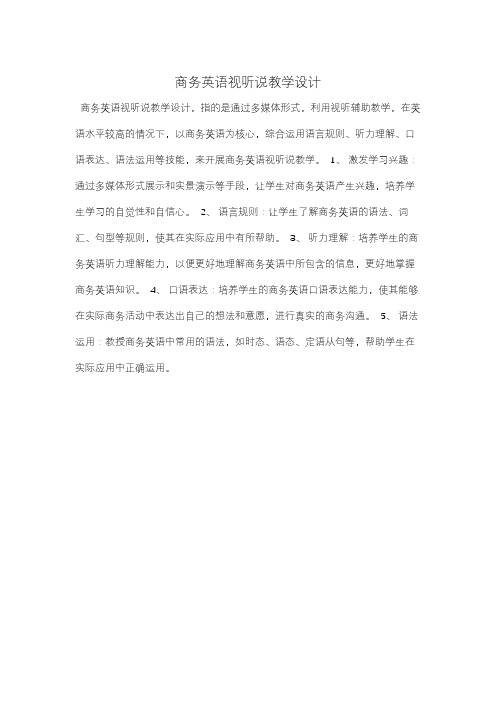
商务英语视听说教学设计
商务英语视听说教学设计,指的是通过多媒体形式,利用视听辅助教学,在英语水平较高的情况下,以商务英语为核心,综合运用语言规则、听力理解、口语表达、语法运用等技能,来开展商务英语视听说教学。
1、激发学习兴趣:通过多媒体形式展示和实景演示等手段,让学生对商务英语产生兴趣,培养学生学习的自觉性和自信心。
2、语言规则:让学生了解商务英语的语法、词汇、句型等规则,使其在实际应用中有所帮助。
3、听力理解:培养学生的商务英语听力理解能力,以便更好地理解商务英语中所包含的信息,更好地掌握商务英语知识。
4、口语表达:培养学生的商务英语口语表达能力,使其能够在实际商务活动中表达出自己的想法和意愿,进行真实的商务沟通。
5、语法运用:教授商务英语中常用的语法,如时态、语态、定语从句等,帮助学生在实际应用中正确运用。
新视野英语视听说1教案(第三版)

---课程教案课程名称英语视听说 1授课学期2018-2019 第一学期授课班级翻译1801授课教师马丽娅系(部)外语系使用教材新视野大学英语视听说 1长治学院教务处制---教案内容:一、教学目的和要求;二、教学重点;三、教学难点;四、教学方法与教学手段;五、教学过程;六、作业或思考题;七、参考文献;八、课后分析;课程基本信息□公共必修课□公共选修课课程类别√专业必修课□专业选修课□学分学时 1.5 学分26 学时使用教材郑树棠,《新视野大学英语视听说教程1》,外语教学与研究出版社,2015 年参考1.郑树棠,《新视野大学英语视听说教程 1 教师用书》,外语教学与研究出版社,2015 年书目2.张明伦,《英语听力入门I-IV 》,华东师范大学出版社,2009年.3.潘培忠,《VOA 新闻听力教程》,青岛出版社,2001年.通过对英语(师范)专业大一学生进行初步的专业听力技能训练使其能听懂教师的课堂用语以及对课文内容所作的解释;听懂他人以较慢的语速谈课论日常生活;听懂基本没有生词、题材熟悉、难度略低于高三所学课文的程语段,理解正确率达到70%。
通过一学期的学习,能够听懂英语语言国家人教士所作的难度不超过所学语言知识的讲座,掌握中心大意,理解主要内容,并能辨别说话人的态度和语气。
听懂VOA慢速新闻广播和文化节目,抓住学主要内容。
能在15分钟内听写根据已学知识编写而成或选用的录音材料(词目数120个左右,念四遍,语速为每分钟80个单词),错误率不超过10%。
的能熟练地就课文内容进行问答,并进行简单的讨论;经过准备,能简及单而连贯地复述听过的或读过的语段;能就日常生活的话题进行初步交际;能清楚而连贯地讲述学生熟悉的题材和课文内容,长度不少于八句。
通过要一学期的学习,口语水平应逐步在初级基础上有所提高:能就所听到的语求段进行问答和复述;能就日常生活话题进行交谈;做到正确表达思想,语音、语调自然,无重大语法错误,语言基本得体。
商务英语视听说第一单元教案1
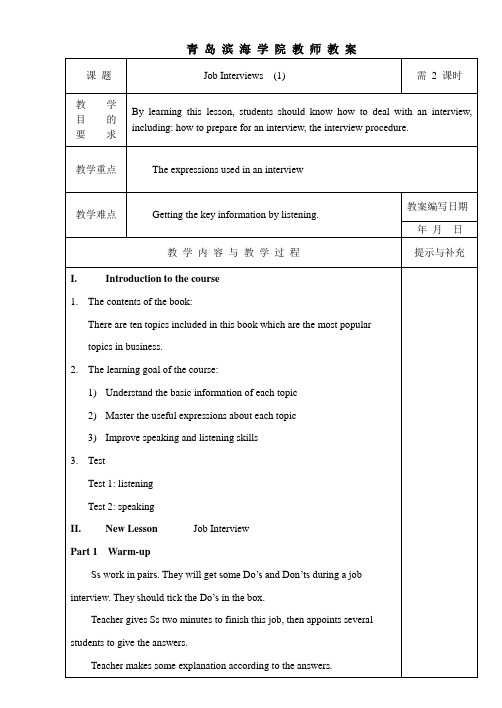
2.The learning goal of the course:
1)Understand the basic information of each topic
Teacher will explain some difficult points.
Follow-up Practice
Ss will hear part of an interview dialogue about interests and personality. They need to choose the correct questions.
Task 2
Ss work in pairs to match the questions with the corresponding answers.
Teacher checks the answers and explain some difficult points,such as be based in, life insurance, depend on , etc.
Part 1 Warm-up
Ss work in pairs. They will get some Do’s and Don’ts during a job interview. They should tick the Do’s in the box.
Teacher gives Ss two minutes to finish this job, then appoints several students to give the answers.
新视野第二版第一册视听说教案
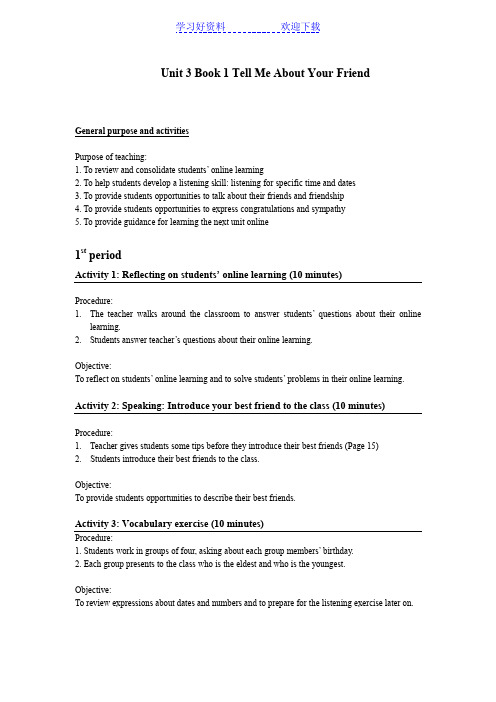
Unit 3 Book 1 Tell Me About Your FriendGeneral purpose and activitiesPurpose of teaching:1. To review and consolidate students’ online learning2. To help students develop a listening skill: listening for specific time and dates3. To provide students opportunities to talk about their friends and friendship4. To provide students opportunities to express congratulations and sympathy5. To provide guidance for learning the next unit online1st periodActivity 1: Reflecting on students’ online learning (10 minutes)Procedure:1.The teacher walks around the classroom to answer students’questions about their onlinelearning.2.Students answer teacher’s questions about their online learning.Objective:To reflect on students’ online learning and to solve students’ problems in their online learning. Activity 2: Speaking: Introduce your best friend to the class (10 minutes)Procedure:1.Teacher gives students some tips before they introduce their best friends (Page 15)2. Students introduce their best friends to the class.Objective:To provide students opportunities to describe their best friends.Activity 3: Vocabulary exercise (10 minutes)Procedure:1. Students work in groups of four, asking about each group memb ers’ birthday.2. Each group presents to the class who is the eldest and who is the youngest.Objective:To review expressions about dates and numbers and to prepare for the listening exercise later on.Activity 4: Listening for specific time and dates (10 minutes)Procedure:1. Review the different expressions and patterns in the listening exercise (listening skills on Page 31)2. Check the answers of the listening exercise (Page 31).Objective:To make students identify some expressions and patterns about specific time and dates in the listening exercise.Activity 5: Having a conversation (10 minutes)Procedure:1. Students work in pairs to have a conversation about at which specific time when they and their friends did something together. (It could be an unforgettable event or regular routine every day.)2. Students present their stories in front of the class.Objective:To review the words and expressions in this unit, and practice oral English.2nd periodActivity 6: Vocabulary exercise (10 minutes)Procedure:1. Students work in groups of four, and recall words and expressions about friends and friendship, and write them on a piece of paper.2. The teacher asks students to write their words on blackboard and review them together.Objective:To review more words and expressions about friends and friendship and to prepare for the listening exercise later on.Activity 7: Listening for details (10 minutes)Procedure:1. Review the different expressions and patterns in the listening exercise (listening in task 1 Page 32).2. Check the answers of the listening exercise (Page 32).Objective:To make students recall the different expressions and patterns, and consolidate students’understanding of the listening exercise.Activity 8: Further listening (10 minutes)Procedure:Check the answers of Task 1 in “Further listening”(Page 42).Objective:To make students recall more words, expressions and patterns and provide students listening exercises.Activity 9: Discussion (10 minutes)Procedure:1. Students work in groups of four, discuss the meaning of the quotations on the textbook(page 30) with an example or a story.2. Each group chooses one quotation to present their explanations to the class.3. The secretary of each group gives a report in front of the class.Objective:To help students learn how to use the expressions and patterns they have studied in this unit.Activity 10: Homework & Prevision of the next unit (10 minutes)Procedure:1.Homework for students:Homework #1: Task 2 in “Further Listening” (P42)Homework #2: Model 2 & 3 in “Speaking out” (P36&37)2. The teacher gives guidance about learning the next unit online.Objective:To assign homework and help students with their online learning.。
新视野商务英语视听说(第二版)(上)教案

.tenretni morf noitamrofni hcraes : gnitirW
krowemoH
01
enoemos rof gniksa flesruoy gnicudortni
enohp eht gnirewsna llac fo sepyt
senohpoediv evah t’nod llits ew rebmemer .01
detcennoc eb ot ksA
ot elba eb dluohs stneduts ,nossel siht gnitelpmoc retfA sevitcejbo gnihcaeT 3 tinU
enohp eht rewsnA
enohp eht nO
nac uoy ,dedeen fi . ti fo seitilibisnopser eht ebircsed dna boj laedi ruoy enigami
gnidulcni ,weivretni na htiw laed ot woh wonk dluohs stneduts ,nossel siht gnitelpmoc retfA evitcejbo gnihcaeT 1 tinU
weivretni na rof eraperp ot woh --
tluser eht teg ot kcab llac a egnarrA
boj eht fo stnemeriuqer eht rof tif uoy ekam slliks dna snoitacifilauQ ynapmoc eht dna boj eht fo sliateD boj tsal gnivael rof snosaeR ssucsid ot elba eb lliw uoY snoitseuq detaler noitisoP ecneirepxe krow ruoY noitacude ruoY
外研社新视野商务英语视听说_第三版_上__电子教案unit10
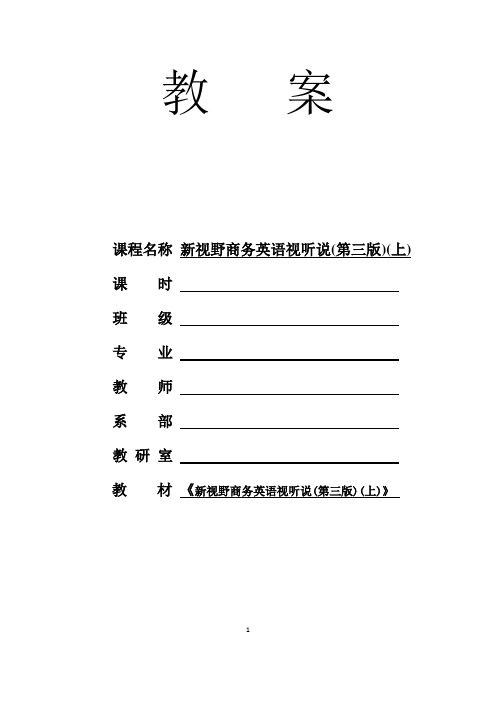
教案课程名称新视野商务英语视听说(第三版)(上) 课时班级专业教师系部教研室教材《新视野商务英语视听说(第三版)(上)》1Unit 10 Company Performance Learning Objectives(教学目标)2Business Profile(内容概览)Want to Know About Company Performance?By the end of each financial year, all publicly traded companies will release a report to tell shareholders, prospective investors, customers and others about the company performance, i.e. how business ran in the past year. We call this the “annual report”. The report includes quantifiable and unquantifiable information which has been audited and required by the SEC (Securities and Exchange Commission). Reading annual reports is an excellent way to familiarise yourself with a company and its market.Annual Reports DescriptionAn annual report is a report presented each year by the directors to the members and shareholders of a company, giving information about the company’s trading activities and including certain documents which must be produced by law, namely the balance sheet, the profit and loss account and the auditors’and directors’reports.Format of Annual ReportsMost annual reports follow a very similar format, in terms of the different types of information they contain.Common sections are:—A letter from the company chairman/CEO (The Chairman’s Statement)—The financial highlights—The balance sheets—The profit and loss statements3—New business reports—The annual review—Projections—Outstanding stock shares and value—A complete list of the board membersChairman’s Statement DescriptionThe Chairman’s Statement is made by the chairman of a company at its annual general meeting and is often included in the annual report. The statement is not required by law and there are no regulations as to its contents, but it often contains interesting and useful information about the company.Who reads the Chairman’s Statement?Reading the narrative element of an annual report in conjunction with the financial statements helps with their interpretation, and it can give a telling overview of the company even before the finances are examined. Shareholder surveys suggest that Chairman’s Statement is the most readable section of an annual report, perhaps because it is in narrative form and also likely to deal with future prospects. And it is also considered highly useful by analysts. Research shows that the content of the Chairman’s Statement indicates performance changes or even whether a company is at risk of bankruptcy.Balance Sheets DescriptionA balance sheet is a statement showing the financial condition of a business on a certain date (usually at the end of an accounting period) with an aim of giving, in a single document, some means of measuring the financial position of the business and4of judging its value as an investment. It contains the balances of the ledger accounts separated into liabilities (mainly capital invested, creditors, reserves, e.g. for staff pensions) and assets (mainly land and buildings, machinery, stock-in-trade, cash, investments, and amounts receivable from debtors).What is a balance sheet used for?A balance sheet helps any interested person quickly get a handle on the financial strength and capabilities of the business. Is the business in a position to expand? Can the business easily handle the normal financial ebbs and flows of revenues and expenses? Or, should the business take immediate steps to bolster cash reserves? Balance sheets can identify and analyse trends, particularly in the area of receivables and payables. Is the receivables cycle lengthening? Can receivables be collected more aggressively? Is some debt uncollectable? Has the business been slowing down payables to forestall an inevitable cash shortage?Balance sheets, along with income statements, are basic elements in providing financial reporting to potential lenders such as banks, investors, and vendors who are considering how much credit to grant the firm.5Language Expansion(语言扩充)6Teaching Tips(教学步骤)Pre-viewing●Pre-class task. Assign two Ss to do some research work on general situation of the airline industry (domestic and global). Tell them to put together a three-minute report on the findings.●Have two Ss report to the class.●Divide the class into groups of three/four and assign group leaders.●Ask the groups to read the passage and exchange ideas about the two questions.●Have group leaders take notes and draw conclusions.●Ask a few group leaders to report to the class.●Encourage questions when the reports are finished.●Give comments on the reports.Post-viewing●Divide the class into groups of three or four.●Ask Ss to take turns to give the report within the group.●Remind Ss of the use of third person pronoun and past tense.●Ask two or three Ss to give the report to the class.●Assign a timer to stop the reporter when the given time is over.●Ask a few Ss to note what they like or dislike about each report.7Pre-viewing●Have Ss tick the items that they think need to be covered in the interview individually.●Ask Ss to compare their answers with a partner and explain their reasons.●Remind Ss to use different expressions in agreeing and disagreeing.●Ask a few Ss to share their ideas with the class.8Text Bank(扩展阅读)Chairman’s Statement(Extract)Dear fellow shareholders:A year ago today, I wrote to you about my confidence that you would see a strong earnings recovery from Pearson in 2008, even in the uncertain times.I am pleased to say that we have kept that promise—in spite of the fact that the drought in business advertising has proved more severe and more enduring than any of us could have imagined. However, as a shareholder in Pearson myself, I am painfully aware that our share price has dropped dramatically over the past 24 months. It is little consolation that most of our media peers have experienced similar declines. As I write this, the newspapers are full of headlines about prolonged economic and political uncertainty, stock market falls and international terrorism. Why, therefore, am I still confide nt about Pearson’s future?1. We are now in three fundamentally strong long-term businesses.2. The governance of Pearson is in good health.3. Pearson’s work is done by many, many bright, energetic and totally committed people.We have set about 2009 with confidence and determination. We tried not to be distracted by irrational exuberance when the markets boomed, and we won’t be deflected by irrational pessimism on the way down. We’re keeping our eyes firmly fixed on the big picture—which is that we have three world-class businesses, better managed than ever before, with leading positions in long-term attractive markets. That’s a powerful combination that will ensure that Pearson will continue to make good progress this year and for many years to come.Discussion:1. Pearson makes profits mainly from education and consumer publishing. Do you agree with the chairman that those are strong long-term businesses? Why?2. If you were looking for a company in which to make your first investment, would you put Pearson on your list? Why or why not?9补充教学资源Video 1Welcome, ladies and gentlemen.I am pleased to announce that this year has been a very good year for our company. Overall, we’ve increased our market share from 37 percent to 48 percent. That’s a signif icant increase. We ordered 35 new planes last year. To date, we have received 15 of them, which we are using on both our domestic and our international routes. That brings our total number of planes to 84.We’ve also developed an extensive program to train all our employees on the new aircraft. So far, two-thirds of the pilots and three-quarters of the mechanics have already finished training.We’ve opened several new routes this year, and we have extended service on our popular Singapore route.With our increased focus on customer service, customer complaints have dropped to seven and a half percent, down from 15 percent last year. That’s 50 percent less than last year.And the number of passengers continues to rise. This year, we’ve carried 12 million passengers, an increase of five and a half percent over last year. August, in particular, was a very strong month. If you look at the chart here, you’ll see that we carried 1,336,000 passengers in August, an increase of 8 percent over the same period last ye ar. And our cargo service is growing fast. We’ve carried 50 million kilos of cargo, an increase of 56 percent over last year’s figures.10Video 2We are No. 1!Allen Zhou: Good morning, Miss Kasumi.Kasumi: Good morning, Mr. Zhou. Nice to see you again.Allen Zhou: Nice to see you too. Please sit down. Tea or coffee?Kasumi: Tea, please.Allen Zhou: It’s a bit chilly today.Kasumi: Yes. The weatherman said it would be even colder tomorrow. Thank you.Allen Zhou: Come in!Secretary: Excuse me. Mr. Zhou, your air ticket. 8:50 tomorrow morning.Allen Zhou: Thank you.Kasumi: You must have been very busy these days, Mr. Zhou. I understand that you have set up a new plant in Jiangsu.Allen Zhou: Yes, you’re right. Our new plant has just started running. I need to go down there once every week to make sure that everything is under control.Kasumi: I see. Perhaps we can get started now, Mr. Zhou?Allen Zhou: Yes. Er… a second. Well, this morning, I’ll tell you about the business performance of our company in the y ear 2004. After that, we’ll show you around our main plant.Kasumi: OK.Allen Zhou: This is our financial report. It contains some graphs that will help you get a clearer picture of our business.Kasumi: Great. Thank you.Allen Zhou: As you know, we make and sell refrigerators and washing machines. As you can see from this bar graph for the year 2004, our business is getting big. The annual turnover reached 10.2 billion yuan. That’s an increase of about 112%11over the previous year.Kasumi: Your profit also increased?Allen Zhou: Definitely. Look at the next graph. Our profit amounted to 725.33 million yuan, an increase of over 64% over 2003.Kasumi: Wow!Allen Zhou: These two pie graphs show the total output of our main products, refrigerators and washing machines. First look at this one on the right, the total output of refrigerators stood at 2.1 million units, of which nearly half were exported.Kasumi: Which countries are your leading export markets?Allen Zhou: United States and some European countries.Kasumi: I see. How about washing machines?Allen Zhou: The total output of washing machines in 2004 was 1.98 million. 0.7 million units were exported.Kasumi: You seemed to put great emphasis on overseas markets. How about your performance in the domestic market?Allen Zhou: That’s a very good question. In fact, that is the point I’d like to talk about next. Our domestic market shares are increasing steadily. We took 23% of the refrigerator market and 15.6% of the washing machine market. These two figures place us at No. 1 in both markets.Kasumi: That’s pretty impressive.Alen Zhou: Now let’s look at…12。
新视野商务英语视听说(上):第四版教学课件U4
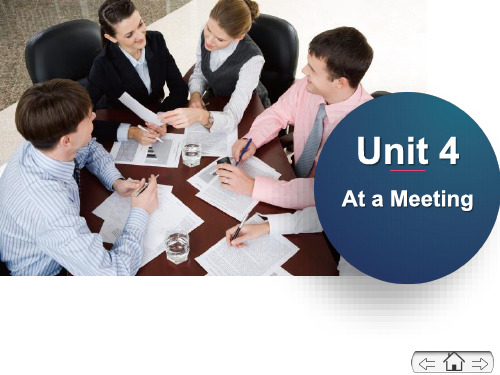
Collect Write Invite
list min(4) (5) (7) (1) (3)
agenda decision
topic Arrange
Script
Task 2 1. You will hear some business people talking about things that can go wrong at meetings. Complete the sentences and tick three items that you consider the top causes of meeting ineffectiveness and then state your reasons.
Script
Conversation 3 A: Let’s see, we’ll begin with my boss opening the meeting. He can remind everyone about the report and letter. Then we should have the Accountant report on the cheques that have been written. Following that, we’ll ask the Purchasing Manager to review the purchasing procedure. I’m sure my boss and Tony will have some questions then, so next we’ll have questions. Then, we can go on to a discussion. Finally, hopefully, we’ll make a decision and close the meeting. There, that should do it! Conversation 4 A: Hello! Why don’t you sit here? Would you like a cup of coffee or tea? C: Thanks! Coffee, please. A: Good afternoon, Tony. Here’s a seat for you. B: Is everyone here yet? A: No, not quite. The Accountant has still to come. Boss, here’s your coffee. B: Thanks. I want to get started on time. A: Yes, I know. I’m sure we will.
新视野商务英语视听说(上):第四版教学课件U1
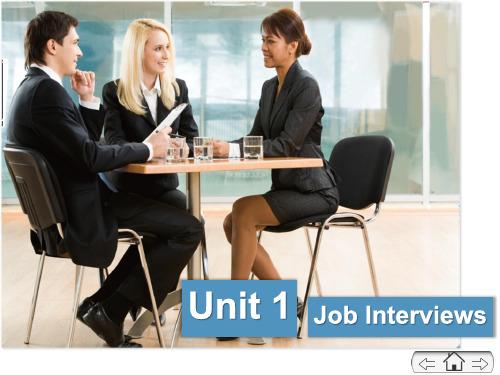
What achievements/awards have you got? I promoted our products in over ten provinces and last year my turnover amounted to
I was the manager of the Human Resources Department. • What was your responsibility?/What were you in charge of?
They were all above average. • Did you get any honours or awards at your university?
After completing this unit, students should know how to deal with an interview, including: ➢ how to prepare for an interview;
➢ the interview procedure;
Yes. I was a member of the dancing club./I was in the department basketball team.
Warm-up Listening Practice Language Focus B Video 2
Language Focus A Business Culture
• Did you have any trouble finding us? Not really. I am familiar with this area.
商务英语视听说教案
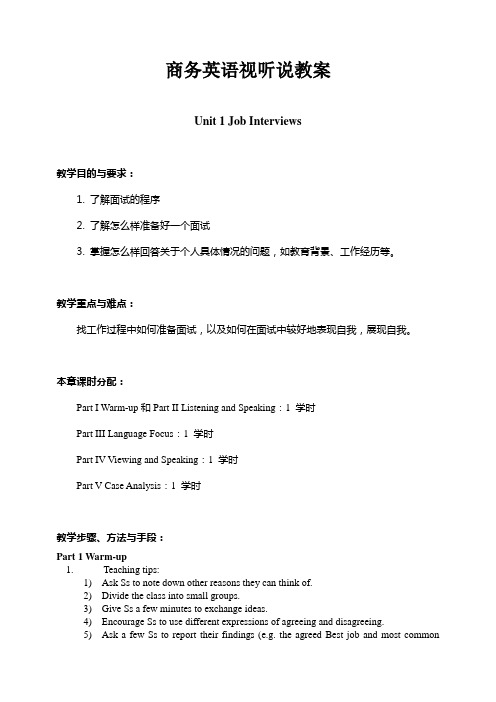
商务英语视听说教案Unit 1 Job Interviews教学目的与要求:1. 了解面试的程序2. 了解怎么样准备好一个面试3. 掌握怎么样回答关于个人具体情况的问题,如教育背景、工作经历等。
教学重点与难点:找工作过程中如何准备面试,以及如何在面试中较好地表现自我,展现自我。
本章课时分配:Part I Warm-up和Part II Listening and Speaking:1 学时Part III Language Focus:1 学时Part IV Viewing and Speaking:1 学时Part V Case Analysis:1 学时教学步骤、方法与手段:Part 1 Warm-up1. Teaching tips:1) Ask Ss to note down other reasons they can think of.2) Divide the class into small groups.3) Give Ss a few minutes to exchange ideas.4) Encourage Ss to use different expressions of agreeing and disagreeing.5) Ask a few Ss to report their findings (e.g. the agreed Best job and most commonreason(s), the most unique/strange choice or reason, etc.).Key: Open.2. Teaching Tips:1) Divide the class into small groups.2) Give Ss a few minutes to talk about their suggestions.3) Encourage Ss to use different expressions of giving advice.If I were you /If I were in your position /If I were in your shoes, I would…How about /What about /Have you thought about…?Why don’t you…?You should perhaps…You’d better…It might help if you…I don’t think you should…4) Have one person in each group as the job candidate, the others being friend who offer suggestion. Ask the group to role-play a conversation.5) Invite two or three groups to act out their conversation.Hints:1) Pay attention to 4Ps: preparation, presentation, personality and positive attitude.2) Dress appropriately.3) Make full preparation for the interview:a. Learn about the position;b. Learn about the company or organization from their websites;c. Anticipate questions and prepare your responses;4) Don’t forget to bring a pen /pencil and a writing pad.5) Pay attention to your manner:a. Be punctual;b. Be truthful;c. Don’t show off;d. Don’t badmouth.Part 2 Listening and SpeakingTask 1 FAQs in job interviewsTeaching Tips:Pre-listening:1) Show pictures of Shangri-La Hotel in different cities of the world.2) Give Ss a few minutes to share what they know about the hotel, the position, etc.3) Check Ss’ understanding of the position.Comments on the three questions:Q1.It’s the ice-breaker of the interview and it’s always a challenge to answer because it’s so broad. The best approach is to narrow the scope of the question by focusing on those aspects of your educational background and experience that make you qualified for the position. From there, you can talk about your interest in this particular job.Q2.When asked this question, you should highlight skills that demonstrate a competency relevant to the job applied for, such as report writing, time keeping or your ability to get things done on time. You can also mention that you are able to get along with people easily, you are a fast worker, or you have an eye for details. The job advertisement will give you information on skills required for the position, so focus on these areas by using examples that demonstrate your skills.With weaknesse s, you can point out one area that is “comparatively” weaker than others, but will not disqualify you from the job. More importantly, you should follow up with what you are doing or have done to fix your weakness.Q3.The best way to respond is to describe the qualifications listed in the job posting, and then connect them to your skills, experiences, as well as job objectives. That way the employer will see that you know about the job and you have the qualifications and enthusiasm to do the job. Sample answers:Q1.I am graduating in June from ABC University and my major is hotel management. I am an outgoing, energetic person. I enjoy teamwork very much. As part of my degree program, I needed to finish different projects with my teammates. I possess excellent interpersonal skills and a very positive attitude. My career aspiration is to become a successful hotelier. During my internship at the Grand Hyatt, I worked as a receptionist. My duties included offering friendly and efficient check-in and check-out service to guests, answering phone calls, taking and passing on massages to guests. I find that if I can make the guests happy, I will be very happy, too.Q2.I received honors in several school-wide English and computer contests. I enjoy working with people from different backgrounds. I am good at communicating, organizing and coordinating. If something blocks my path, I will look for a solution. I never give up easily.Sometimes I receive comments that I need to improve in the area of filing. I am now trying to improve by learning from others.Q3.Interest and career development are two of my criteria in the choosing a job. Interest is the best motivation. I love the hotel business, so I will definitely devote myself to it. Moreover, high job satisfaction can be attained when the job is what I am interested in.Career development is very important for me when choosing a job. From what I know, Shangri-La provides equal career advancement for all staff. The job rotation plan and individually tailored training program are really exciting and helpful for young people like me. Task 2 Inappropriate questions in job interviewsPart 3 Language FocusFollow-up practiceTeaching tips:1) Ask Ss to note down the key points of the interview.2) Divide the class into pairs. Get Ss to allocate the roles.3) Ask Ss to role-play the job interview according to the noted points and with the helpof the expressions in Language Focus.4) If time allows, ask Ss to swap roles and role-play the interview again.5) Invite a pair to act out the interview in class.6) Give comments and suggestions for improvement.Key:Name:Cai NingPersonality:serious-minded; calm; humorous; easy-goingStrengths and weaknesses:Strengths: the ability to work with all types of peopleWeaknesses: perfectionist; impatientWork experience:six year’s financial industry with several companies; two years’ experience in an investment bankQualifications:graduated from Peking University in 2001, majoring in accounting; fluent English; bookkeeping and accounting proficiency in EnglishReasons for leaving last job:want to find a job that is challengingQuestions about the job: would I be able to work abroad in one of you overseas branches? Language expansionAbout the job and company1) What do you know about this company?I understand that you are one of the major global players in air industries, operating inmore than 20 countries.2) Why are you the best person for the job?I have been working in sales for five years. I think my experience in this field canbring the benefits to this position and your company.3) Is there anything that you would like to know about the job or company?Yes, would you please tell me what my responsibilities would be if I had his job? About future plan1) What are your goals for the next five years?In five years’ time, I think I will have achieved a lot if you give me an opportunity to work in your company. I hope to be promoted to the position of Sales Manager by then.2) How do you plan to achieve this goal?I will work hard, meet challenges and improve myself in an all-round way. I haveconfidence in myself.3) How long will you stay in our company?Well, that’s hard to answer. If I got this position, I’d say I would stay in this positio n as long as my work and efforts are still valuable to the company.About salary1) What kind of salary do you have in mind?What would you offer to someone with my qualifications and potential?/ I will consider any reasonable offer./ I’m aware of the range in the marketplace. I’m sure you’ll come up with a most appropriate offer that will be based on my background and ability. About abilities and skills1) What special skills do you have?I can speak an write English fluently./ I’m good at communicating with people./ I’mgood at numbers./ I’ve been working on computer programming for five years. I’d say I’m kind of expert in this field.About strengths1) Can you tell me something about your strengths?I’m confident and honest./ I don’t panic in a crisis./ I never give up easily. I’m persistent in looking for a solution./ I think I can work with all kinds of people. About weaknesses:1)What are your weaknesses?Perhaps I’m a bit straightforward./ I’m kind of perfectionist. I want to be perfect in doing everything./ Sometimes, I’m a little bit indecisive.Part IV Viewing and SpeakingVideo 1 Applying for the position of financial consultantPre-viewing1. Teaching tips:· Divide Ss into small groups.· Ask Ss to:1) rank the importance;2) compare their ranking with other group member;3) give explanation;4) change the ranking if convinced.·Encourage Ss to use different expressions of agreeing and disagreeing.·Ask tow group representatives to give their ranking and explain the change if there is any. Key: Open.ViewingPost-viewingTeaching tips:·Divide the class into groups of three/five (odd numbr is preferred for voting).·Have Ss exchange ideas within the group and then vote for the job offer decision.·Ask two group representatives to report on their goup discussion and decisions. ·Encourage other Ss to offer their own views.·Give comments and help Ss summarize the reasons.Hints:1)Strengths:·Degree in international finance.·Passion/determination for the job.·Being young and energetic.·Fluency in English.·Good appearance.·Knowing how to tackle problems.Weakneese:·Little related experience or training.2)Open.Video 2 Applying for the position of Sals ManagerPre-viewing1. Teaching tips:·Divide the class into pairs.·Have Ss discuss the three questions and put together a group answer.·Ask three pairs to share their answers with the class,each dealing with one question.·Invite other Ss to offer their own views.Hints:1) People may change jobs for job challenge,better pay,promotion,better workingenvironment,more flexble working hours,etc.They may also look for new jobs because they move to a new place or lose their original jobs.2) Managing and training the sales team,developing the asles strtegy and implementit,coordinating with other departments of the company,ensuring the achievement of the pre-set sales target,etc.3) Strong presentation,communication and negotiation skills,work experience in salesposition,university degree in business management or relevant major,willing to travel,being detail-oriented,etc.ViewingKey:1. F 1)In the summers of 1996 and 1997,Merry worked as a salesgirl for this company inGuangzhou.T 2)Merry passed TEM 8 at college,and she is good at oral English.F 3)Merry has worked for United Butter for two years since she graduated from college.F 4)Merry will be in charge of the marketing activities in southeast China.T 5)Merry’s current annual income in United Butter is 150 thousand.Teaching tips:·Divide the class into small groups.·Have Ss exchange ideas within the group.·Ask two group representatives to share their ideas with the class.·Encourage other Ss to offer their own views.·Give comments and help Ss summarize the answers.Key:Open.Part V Case AnalysisTeaching tips:●Ask Ss to take detailed notes while listening.●Ask Ss to exchange ideas in pairs.Remind them to give examples to support their points. ●Give Ss a second chance to listen to the interview if they failed to note down the keyinformation.●Allow Ss a few minutes to prepare an improved version of the interview.●Choose a few pairs o role-play the revised interview in class.●Invite other Ss to give comments and suggestions for improvement.Hints:●She is not likely to get the job because she did poorly in the interview.●Things went wrong:●Use filler words (“you know”) too many times.●Bad-mouth former employer.●Inappropriate anwers to interviewer’s questions,e.g….I would rather like to establish myown company…●Ask inappropriate questions,e.g.Can I take time off for vacation?●Self-conceit—‘’have no weaknesses’’.●Too much emphasis on travel.Unit 15 Marketing教学目的与要求:1. 了解市场营销基本词汇及基本要素。
商务英语视听说教案

It’s lovely/warm/sunny/dismal/cloudy/cold/damp/wet/stormy/windy
2.小组讨论(3分钟)
视频播放完毕,学生进行小组讨论,形成接机及办理酒店入住的工作任务流程。
3.接机及办理酒店入住的流程介绍(5分钟)
素质:培养学生具备良好的品行和职业道德修养和团队合作精神。
重、难点分析
教学重点:机场接待与酒店入住相关用语的学习及在相关场景的应用。
教学难点:视听理解与信息分析;机场接待与办理酒店入住的交际实践。
教学内容设计及进程
ⅠStudents regard to teacher, and check on work attendance 30秒
5.Role-play
Divide the class into groups and allocate the roles.
Remind Ss of safe topics for small talks while monitoring the class.
Have some groups to present their conversations in class.
Ⅵ. Homework
5.情景模拟及角色扮演:(30分钟)
学习情境及角色介绍:你是一家公司的外贸部经理,与你公司有贸易往来的加拿大ASC公司贸易代表威尔森女士将于近日抵达你所在的城市,与你进行贸易洽谈,请安排好相关工作人员到机场迎接并帮助办理酒店入住。
Find out mistakes with expressions, etiquettes and commutations, to expend this lesson.
